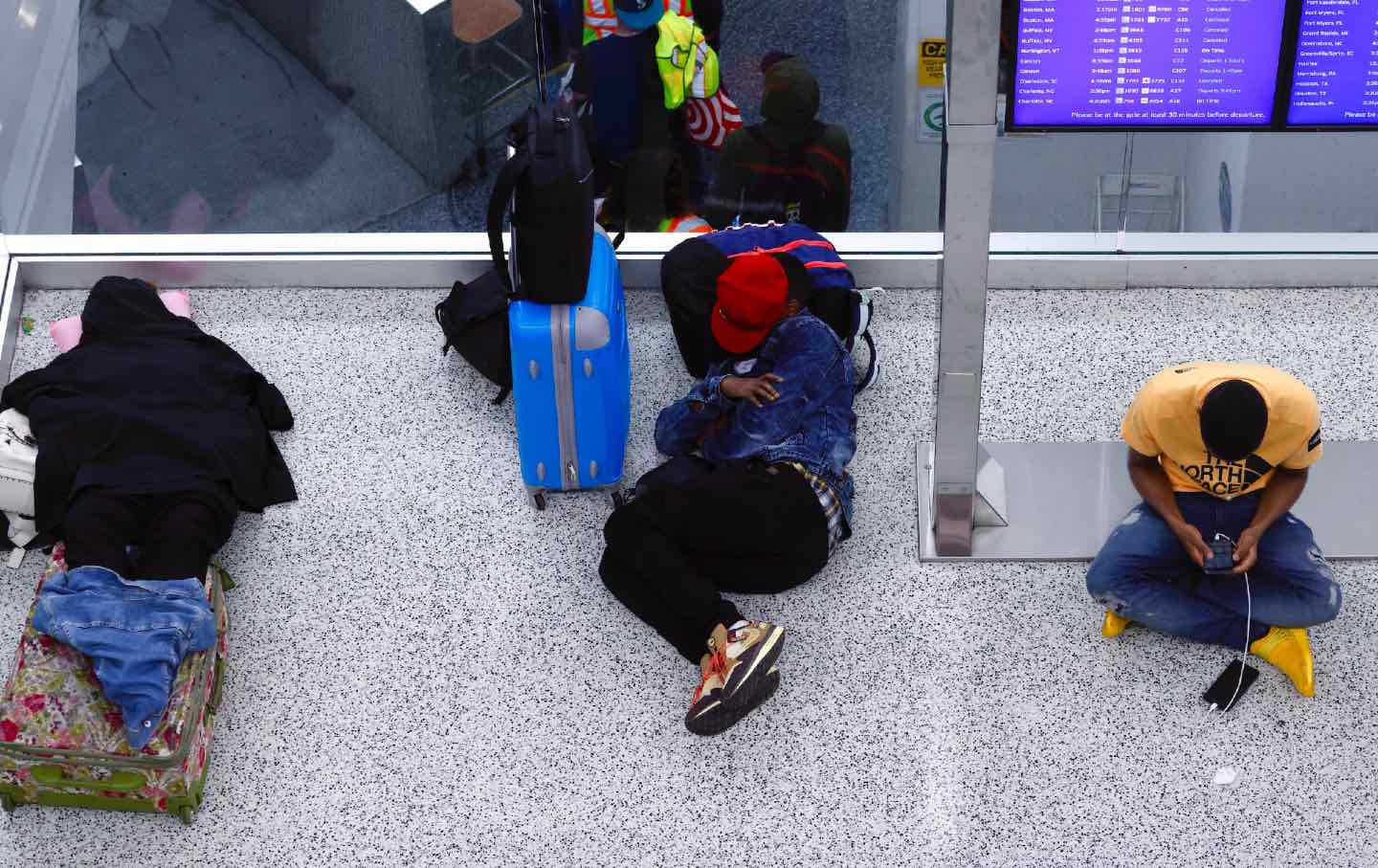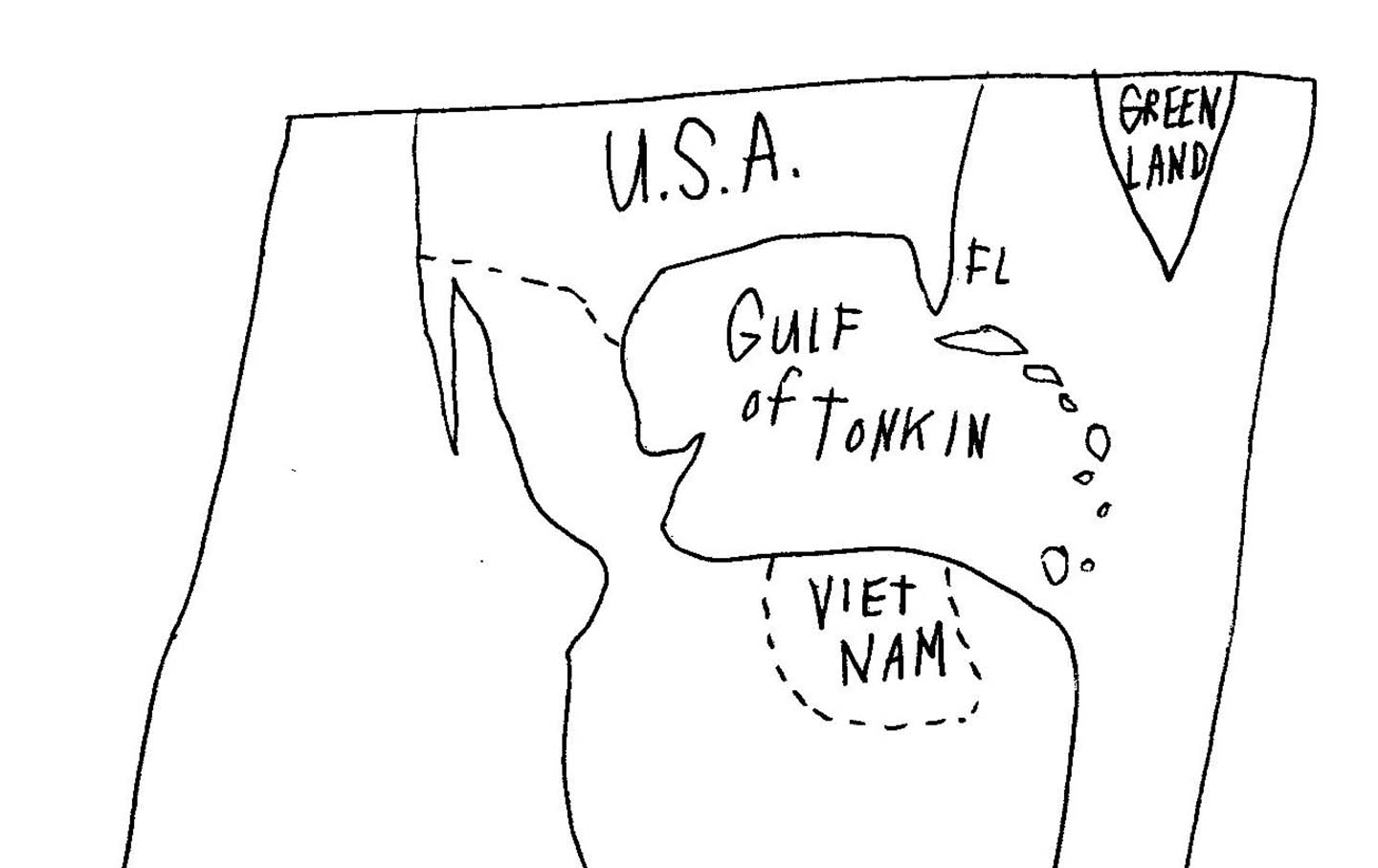Fear of Flying?
The fight for airline passenger rights—and holding the industry to account.

You’re not imagining it: flight delays are up this summer. At one point in late June, one third of all flights nationwide experienced delays—a 25 percent increase compared to the same range of dates last year. Cancellations were high, too: up a staggering 374 percent from 2019.
Delays and cancellations due to weather are bound to happen. But according to a report from the Government Accountability Office, airlines were responsible for 60 percent or more of their own cancellations in late 2021. So while you can’t blame airlines for bad weather—although considering their role in climate change, maybe you can—there is plenty of room to blame reckless management.
That’s where the Biden administration could step in. With the right regulations, it could rein in an increasingly unpopular industry, and meaningfully improve the lives of American travelers and airline industry workers alike.
Flight delays are more than just an inconvenience. During a recent Delta flight from Las Vegas to Atlanta, passengers endured an almost three-hour wait on the tarmac in sweltering 114-degree heat. Passengers fell ill, and some fainted. Luckily, none died.
And even if you dismiss the Delta disaster as an outlier, there are nightmare travel stories every day that are made worse—or completely caused—by airline mismanagement. Katie Demko, a Missouri traveler, missed her own wedding when Southwest canceled her St. Louis to Belize flight just before boarding. While she received a refund for the flight, she lost a whopping $70,000 in resort reservations. The reason for the cancellation? Southwest had understaffed their flight attendants.
Meanwhile, in Denver, Michelle Maciel was stuck at the airport all night—sitting on hold with United customer service after her flight to Portland was delayed several times and eventually canceled. She told CNN: “I can’t believe I’m 53 years old, I paid for a ticket and I slept on the ground. How is this OK with any of us?”
It shouldn’t be. In the European Union, if you suffer through security, arrive at your gate, and are hit with the dreaded news that your flight has been delayed, you will come to learn the wonders of a regulation called EU 261. Depending on the length of the delay, travelers in Europe are entitled to a refund, additional compensation, meal vouchers, a courtesy phone call to check in with loved ones—and, if the delay is overnight, a hotel reservation and a ride to get there and back. If your flight is delayed in the US, you are entitled to nothing.
But that could be changing.
The Biden administration has repeatedly indicated that it intends to improve consumer protection for airline travel. Proposed regulations would require airlines to cover meal and hotel expenses if the delay was in their control, and offer compensation beyond that. In a recent interview, Transportation Secretary Pete Buttigieg had forceful words for the airlines: “We’re going to beat ‘em up when we think that’s important to get passengers a better deal.”
But the administration’s actions thus far have been restrained. According to a Reuters report, the Transportation Department “asked carriers last year whether they would agree to pay at least $100 for delays of at least three hours caused by airlines.” A step forward, but should we need to ask politely to implement basic consumer protections? Is this what “beating ‘em up” looks like?
Over in Congress, bipartisan legislation just passed the House to increase funding for air traffic controllers—welcome news, since controller shortages often force the FAA to cancel or slow down flights. But because this is Kevin McCarthy’s House, the legislation also includes a provision to raise the mandatory pilot retirement age from 65 to 67, which is strongly opposed by unions and pilot groups. It would also repeal an Obama-era rule requiring airlines to display full flight prices in advertising. In the Republican imagination, the biggest problem with air travel is that the experience isn’t more like getting Taylor Swift tickets.
A better solution would be what Senators Ed Markey and Richard Blumenthal introduced earlier this year: the Airline Passengers’ Bill of Rights, which would guarantee compensation not just for delayed flights, but for passengers impacted by overbooked flights. Senator Markey has been at the forefront of the fight for airline reform—proposing provisions that encourage airlines to clearly communicate passenger rights and reroute those affected by delays.
Popular
“swipe left below to view more authors”Swipe →Such an approach would address a root cause of airline dysfunction: deregulation. Legal scholar Ganesh Sitaraman has a new book coming in November titled Why Flying is Miserable that will offer a new history of the policy mistakes that have charted our course to this undesirable destination.
As it happens, this week marks 42 years since President Ronald Reagan fired striking air traffic controllers. Today, President Biden has a chance to make a different kind of mark on the industry. He can help give air traffic controllers, pilots, mechanics, and other hard-working professionals in this field the compensation they deserve. He can improve the dignity of travel for all. And he can make American life a little less turbulent.
Time is running out to have your gift matched
In this time of unrelenting, often unprecedented cruelty and lawlessness, I’m grateful for Nation readers like you.
So many of you have taken to the streets, organized in your neighborhood and with your union, and showed up at the ballot box to vote for progressive candidates. You’re proving that it is possible—to paraphrase the legendary Patti Smith—to redeem the work of the fools running our government.
And as we head into 2026, I promise that The Nation will fight like never before for justice, humanity, and dignity in these United States.
At a time when most news organizations are either cutting budgets or cozying up to Trump by bringing in right-wing propagandists, The Nation’s writers, editors, copy editors, fact-checkers, and illustrators confront head-on the administration’s deadly abuses of power, blatant corruption, and deconstruction of both government and civil society.
We couldn’t do this crucial work without you.
Through the end of the year, a generous donor is matching all donations to The Nation’s independent journalism up to $75,000. But the end of the year is now only days away.
Time is running out to have your gift doubled. Don’t wait—donate now to ensure that our newsroom has the full $150,000 to start the new year.
Another world really is possible. Together, we can and will win it!
Love and Solidarity,
John Nichols
Executive Editor, The Nation
More from The Nation

Christmas Wish Christmas Wish
The toll is staggering: In 2024, gun violence in the US resulted in 40,886 deaths and 31,652 injuries.

The Christmas Narrative Is About Charity and Love, Not Greed and Self-Dealing The Christmas Narrative Is About Charity and Love, Not Greed and Self-Dealing
John Fugelsang and Pope Leo XIV remind us that Christian nationalism and capitalism get in the way of the message of the season.

Read the CBS Report Bari Weiss Doesn’t Want You to See Read the CBS Report Bari Weiss Doesn’t Want You to See
A transcript of the 60 Minutes segment on CECOT, the notorious prison in El Salvador.

In Memoriam: Beautiful Writers, Influential Editors, Committed Activists In Memoriam: Beautiful Writers, Influential Editors, Committed Activists
A tribute to Nation family we lost this year—from Jules Feiffer to Joshua Clover, Elizabeth Pochoda, Bill Moyers, and Peter and Cora Weiss

Brace Yourselves for Trump’s New Monroe Doctrine Brace Yourselves for Trump’s New Monroe Doctrine
Trump's latest exploits in Latin America are just the latest expression of a bloody ideological project to entrench US power and protect the profits of Western multinationals.



